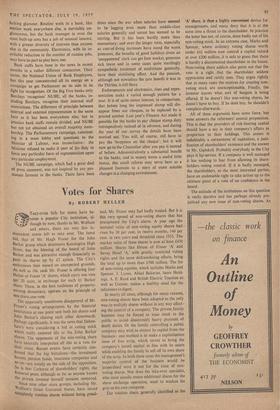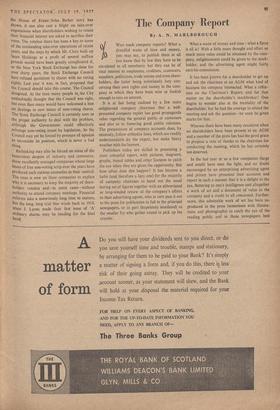Votes for Shares
By ROBERT HELLER
TAKE-OVER bids for stores have be- come a popular City institution, al- though by now, thanks to Mr. Wolfson and others, there are very few in- dependent stores left to take over. The latest bid, that of Mr. Hugh Fraser for the John Barker group which dominates Kensington High Street, has the blessing of the board of John Barker and was attractive enough financially to push its shares up by £2 apiece. The City's enthusiasm then waned on unexpected grounds. As well as 10s. cash Mr. Fraser is offering four House of Fraser 'A' shares, which carry one vote Per 20 units, in exchange for each £1 Barker share. These, in the best traditions of property- owning democracy, operate on the principle of one share, one vote.
The apparently unanimous disapproval of Mr. Fraser's voting arrangements by the financial Institutions at one point sent both his shares and John Barker's chasing each other downwards. Perhaps significantly, it was the news that Deben- harn's were considering a bid in voting stock Which really restored life to the John Barker shares. The opponents of the non-voting share have naturally interpreted all this as a vote for their cause. Recent events have certainly con- firmed that the big battalions—the investment houses, pension funds, insurance companies and so on—are mostly on the side of the opposition. So is that Cerberus of shareholders' rights, the financial press, although so far as anyone knows the
,. private investor himself remains unmoved. Si nce nine other store groups, including Mr.
Wolfson's Great Universal Stores, have issued completely voteless shares without being penal-
ised, Mr. Fraser may feel badly treated. But it is this very spread of non-voting shares that has precipitated the City's alarm. A year ago the nominal value of non-voting equity shares had risen by 30 per cent. in twelve months, 140 per cent. in two years and threefold since 1953. The market value of these shares is now at least £450 million. Shares like House of Fraser 'A' and Savoy Hotel 'A,' with greatly restricted voting rights and the same disfranchising effects, bring the total up to more than £500 million. The list of non-voting equities, which includes Marks and Spencer, J. Lyons, Allied Bakeries, Sears Hold- ings, A. E. Reed and British Electric Traction as well as Gussies, makes a healthy meal for the reformers to digest.
In nearly all cases, although for many reasons, non-voting shares have been adopted as the only way.to multiply shares without in any way affect- ing the control of a company. The private family business may be forced to issue stock to the public to avoid disastrously heavy payment, of death duties. Or the family controlling a public company may wish to extract its capital from the business: one method is to make a capitalisation issue of free scrip, which serves to bring the company's issued capital in line with its assets while enabling the family to sell off its own share of the scrip. In both these cases the management's majority control of the business would be jeopardised were it not for the issue of non- voting shares. Nor does the take-over specialist, who must usually create additional shares for the share exchange operation, want to weaken his grip on his own company.
The voteless share, generally identified as the 'A' share, is thus a highly convenient device for managements, and many deny that it is at the same time a threat to the shareholder. In practice the latter has not, of course, done badly out of his non-voting stock. In an extreme case, Marks and Spencer, where ordinary voting shares worth under £41 million now control a capital valued at over £200 million, it is safe to guess that there is hardly a discontented shareholder in the house. Non-voting share addicts also point out that the vote is a right that the shareholder seldom appreciates and rarely uses. They argue rightly that in many cases the motives for creating non- voting stock are unexceptionable. Finally, the investor knows what sort of bargain is being offered. If he doesn't like non-voting shares, he doesn't have to buy. If he does buy, he shouldn't complain afterwards.
All of these arguments have some force, but none answers the reformers' central proposition. This is that the providers of risk-bearing capital should have a say in their company's affairs in proportion to their holdings. This axiom is indubitably a cornerstone of capitalism, a justi- fication of shareholders' existence and the answer to Mr. Gaitskell. Probably everybody in the City pays it lip-service. If a company is well managed it has nothing to fear from allowing its share- holders voting control. If it is badly managed, the shareholders, as the most interested parties, have an undeniable right to take action up to the ultimate point of a vote of no confidence in the board.
The attitude of the institutions on this question is really decisive and has perhaps already pre- judiced any new issue of non-voting shares. As
the House of. Fraser/John Barker story has shown, it can also cast a blight on take-over negotiations when shareholders wishing to retain their financial interest are asked to sacrifice their votes. The voteless share has been a key to some of the outstanding take-over operations of recent years, and the steps by which Mr. Clore built up Sears Holdings at a profit of several million pounds would have been greatly complicated if, as the New York Stock Exchange has done for over thirty years, the Stock Exchange Council here refused quotation to shares with no voting rights. Last year it was, in fact, proposed that the Council should take this course. The Council disagreed. At the time many people in_the City undoubtedly thought that the Council was right, but even then many would have welcomed a ban on dealings in new issues of non-voting shares. The Stock Exchange Council is certainly seen as the proper authority to deal with the problem,
• although the Government could effectively sabotage non-voting issues by legislation. So the Council may yet be forced by pressure of opinion to reconsider its position, which is never a bad thing.
Rethinking may also be forced on some of the benevolent despots of industry and commerce, those excellently managed companies whose large issues of free non-voting scrip over the years have Produced such curious anomalies in their control. The onus is now on these companies to explain why it is necessary to keep the majority of share- holders voteless and—in some cases—without authority to attend company meetings. Financial reforms take a notoriously long time to mature, but the long, long trial that winds back to 1918, when J. Lyons made their first issue of 'A' ordinary shares, may be heading for the final bend.















































 Previous page
Previous page